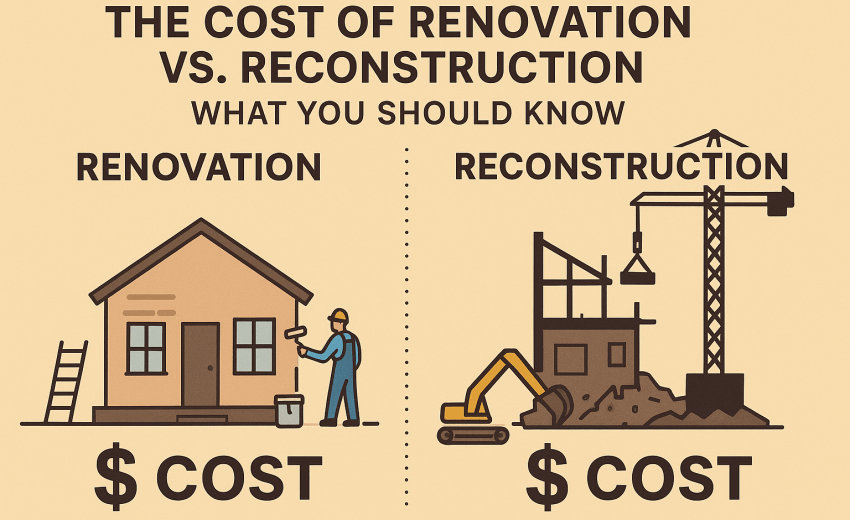
Cost is often the first consideration when deciding whether to renovate an existing property or undertake a full reconstruction. Homeowners and investors frequently face this dilemma, and understanding the nuances of both options can save time, money, and stress in the long run.
What is Renovation?
Renovation involves updating, repairing, or enhancing an existing structure without altering its core framework. This could mean anything from repainting walls and replacing flooring to upgrading kitchens, bathrooms, and HVAC systems. The cost of renovation varies depending on the scope of work, the quality of materials, and the labor required. Minor cosmetic renovations may be relatively affordable, whereas major overhauls that involve structural changes can approach the cost of a reconstruction project.
What is Reconstruction?
Reconstruction entails demolishing the current structure and building a new one from scratch. This approach is often chosen when the existing property is outdated, unsafe, or doesn’t meet current building codes. While the upfront cost of reconstruction is generally higher than renovation, it can be more cost-effective in the long term. A new building often comes with lower maintenance costs, better energy efficiency, and modern design features that can increase property value.
Hidden and Indirect Costs
When evaluating the cost between renovation and reconstruction, it’s important to consider hidden or indirect expenses. Renovation projects can uncover unforeseen issues such as water damage, electrical problems, or structural weaknesses, which can escalate costs. Reconstruction projects, while more predictable in terms of material costs, may incur additional expenses related to demolition, permits, and temporary housing if the property is occupied during construction.
Impact of Timeline on Cost
Another factor influencing cost is the project timeline. Renovations can be faster, especially if limited in scope, allowing homeowners to enjoy improvements sooner. Reconstruction typically requires a longer commitment due to planning, approvals, and building from the ground up. Extended timelines can affect overall cost, particularly if temporary accommodations or storage solutions are necessary.
Design and Customization Considerations
Design and customization preferences also play a significant role in determining costs. Renovation projects often work within existing layouts, which can limit flexibility but reduce expenses. Reconstruction allows complete freedom in design, enabling homeowners to optimize space, incorporate sustainable features, and future-proof their investment. While this level of customization can raise costs, it often adds long-term value that renovation may not deliver.
Regulatory and Legal Considerations
Regulatory and legal requirements impact the overall cost as well. Renovation projects usually require fewer permits and inspections, especially for minor work. Reconstruction must comply with local building codes, zoning regulations, and safety standards, which can add to both time and cost. Engaging experienced architects, engineers, and contractors is essential to navigate these requirements efficiently.
Making the Right Decision
Ultimately, deciding between renovation and reconstruction comes down to balancing cost, needs, and goals. For properties with solid structures and minor functional or aesthetic issues, renovation can be a cost-effective way to enhance value without a full rebuild. In contrast, reconstruction may be the better choice for aging, damaged, or inefficient properties where long-term savings, safety, and modern design justify the higher initial investment.
The Importance of Professional Consultation
The cost of renovation versus reconstruction is influenced by multiple factors, including the scope of work, material quality, labor, regulatory requirements, and long-term benefits. By carefully evaluating these elements, homeowners can choose the option that aligns with both their budget and vision. Whether you opt for a strategic renovation or a complete reconstruction, understanding the financial implications ensures a smoother project and a better return on investment.
Conclusion
Right choices in property development come from careful planning, professional advice, and a clear understanding of goals. Construction gives you a blank canvas to build exactly what you want, while renovation allows you to refresh and repurpose existing structures. Whichever path you take, making the right choice ensures your property investment delivers lasting value, comfort, and satisfaction.
Ready to Build with Confidence?
Get in touch with Charminar to learn how our project management expertise can streamline your next development.
📧 contact@bluediamondfm.com
📞 +971 56 705 4223
🌐 https://charminardubai.com/
Frequently Asked Questions (FAQ)
What is generally more cost-effective, renovation or reconstruction?
Renovation is usually cheaper upfront, but reconstruction may save money in the long term due to lower maintenance and energy costs.
How can hidden costs impact renovation projects?
Unforeseen issues like structural damage or outdated electrical systems can increase renovation costs unexpectedly.
Does reconstruction take longer than renovation?
Yes, reconstruction typically involves a longer timeline due to planning, permits, and building from scratch.
Can renovation increase property value?
Absolutely, strategic renovations can enhance aesthetics, functionality, and overall market value.
Should I consult a professional before deciding?
Yes, professional assessments and cost estimates can help determine the most financially and structurally viable option.







